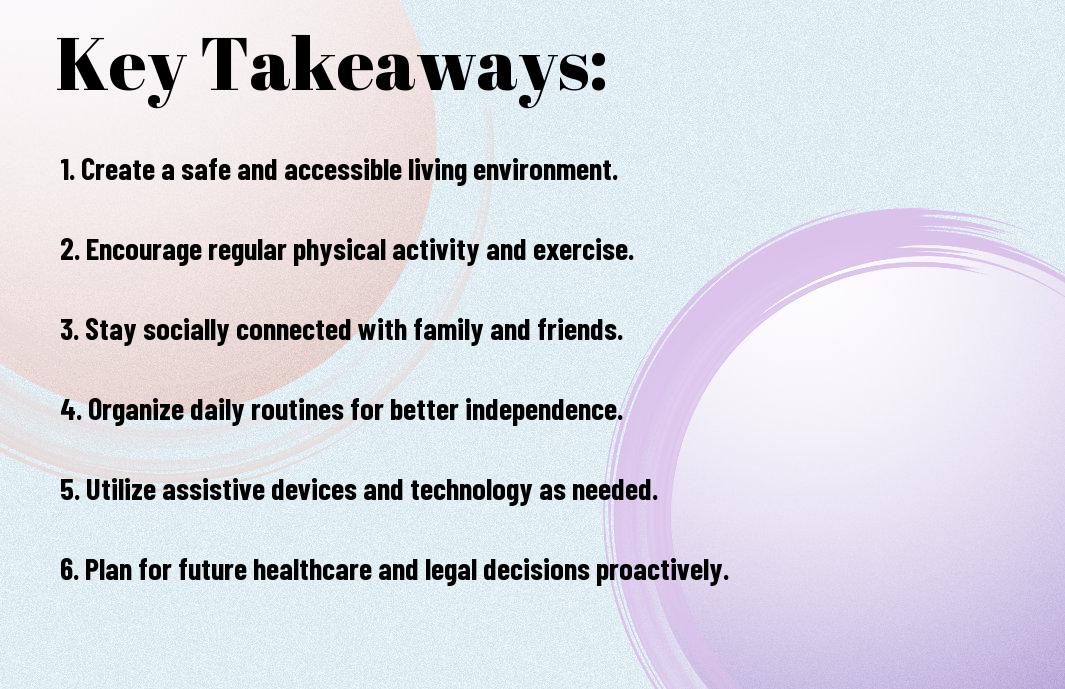Independence is a crucial aspect of life for seniors, contributing to their overall well-being and quality of life. As they age, they may encounter challenges that threaten this autonomy. However, with practical strategies and support from family, they can continue to live fulfilling lives. This blog post provides vital tips for seniors and their families to maintain independence, addressing safety considerations, daily activities, and the importance of open communication. By implementing these suggestions, they can ensure that their loved ones enjoy a sense of freedom and dignity while navigating the later stages of life.
Key Takeaways:
- Adaptation of Living Spaces: Modifying home environments with aids like grab bars, non-slip mats, and proper lighting can greatly enhance safety and accessibility for seniors.
- Encouragement of Social Interaction: Promoting regular social activities and connecting with community resources can help reduce feelings of isolation and improve mental well-being.
- Promoting Physical Health: Engaging in regular physical exercise tailored to individual abilities can maintain mobility, strength, and overall health, contributing to an independent lifestyle.

Understanding Independence
The concept of independence is crucial for seniors as it encompasses their ability to manage daily activities and make personal choices. It fosters a sense of dignity and self-worth, enabling them to lead fulfilling lives. For more insights, check out Caregiver Tips for Maintaining Independence for Seniors.
The Importance of Independence for Seniors
With independence, seniors can retain their identity, make their own choices, and maintain a sense of control over their lives. It encourages engagement and strengthens their emotional well-being, allowing them to thrive socially and psychologically.
Common Challenges Faced by Seniors
Importance of understanding the challenges seniors face is crucial for their independence. As they age, they often encounter issues such as declining mobility, chronic health conditions, and social isolation.
A combination of physical and emotional barriers can significantly impact their autonomy. For instance, reduced strength or cognitive decline may make performing everyday tasks difficult, leading to frustration and diminished self-confidence. Moreover, isolation can exacerbate feelings of loneliness, making it challenging for them to seek the help or companionship they need, ultimately affecting their overall quality of life.
Home Modifications for Safety
Assuming seniors want to maintain their independence, it’s crucial for families to consider necessary home modifications. These alterations help eliminate potential hazards, making the living environment safer and more comfortable. Simple changes can have a significant impact, allowing seniors to navigate their homes with confidence and reducing the risk of accidents.
Assessing the Need for Modifications
One effective way to begin is by conducting a thorough assessment of the home. She can evaluate various areas for potential hazards, such as cluttered hallways, uneven flooring, or poor lighting. By identifying these risks, she can prioritize necessary modifications tailored to her unique living situation, ensuring her home remains a safe haven.
Recommended Modifications
Recommended modifications can significantly enhance safety for seniors. They include installing grab bars in bathrooms, adding non-slip mats, improving lighting, and removing tripping hazards. Each change is aimed at reducing risks, empowering seniors to move freely and securely.
This list of modifications provides practical steps to create a safer home environment. Installing grab bars in bathrooms can help prevent falls, while non-slip mats offer additional traction in high-risk areas. Improving lighting is crucial for visibility, especially at night, while removing tripping hazards ensures clear pathways. Together, these changes enable seniors to retain their independence while minimizing the risk of accidents in their daily activities.

Transportation Options
Not all seniors have the same transportation needs, making it crucial for families to explore various options to maintain their independence. From public transport to specialized services, understanding these alternatives can significantly enhance mobility and quality of life. By examining different resources available, seniors can continue to engage with their community while reducing reliance on family members.
Public Transport Accessibility
With many cities expanding their public transport systems, seniors can benefit from improved accessibility features such as low-floor buses and designated seating. These enhancements make it easier for seniors to board and navigate transit options, providing them with a sense of freedom and independence while also encouraging social interaction and community involvement.
Alternative Transportation Services
Transportation services specifically designed for seniors have become increasingly available, offering solutions tailored to their unique needs. These services provide door-to-door assistance, ensuring that they remain safe and comfortable throughout their journey, even if they require help getting to and from their destinations.
Services like ride-sharing programs and non-emergency medical transportation allow seniors to travel without relying on personal vehicles. Many of these services offer trained drivers who can assist with mobility aids, ensuring that seniors can get to where they need safely. Importantly, these transportation alternatives foster independence and empower seniors to continue living fulfilling lives in their communities, making social engagements and crucial appointments more accessible.
Daily Living Skills
Now, possessing strong daily living skills can greatly enhance a senior’s ability to maintain their independence. These skills allow them to perform necessary tasks and foster a sense of accomplishment and dignity. From personal care to meal preparation, mastering these areas is vital for leading a fulfilling life. Family members can also play a supportive role to help seniors stay active and engaged in daily routines.
Maintaining Personal Care
Any senior can successfully manage personal care with the right strategies. Establishing a consistent routine helps them stay organized and ensures they can maintain their hygiene effectively. Simple tools like grab bars and non-slip mats can enhance safety while promoting independence in the bathroom.
Meal Preparation Tips
For seniors, meal preparation is an necessary aspect of maintaining independence. Consider implementing the following tips for easy and safe cooking:
- Focus on easy-to-handle ingredients.
- Plan meals with pre-prepped components.
- Use prepared meal services when necessary.
- Create a safe cooking environment.
Any person can benefit from a few modifications to make cooking enjoyable and safe.
Living well requires a thoughtful approach to meal preparation. Seniors often face challenges such as limited mobility or dietary restrictions, making it crucial to adopt strategies that promote safety and convenience. Enhancing their kitchen with accessible tools and gadgets can significantly reduce the risk of accidents. It is also beneficial for them to explore nutritious pre-packaged options or to involve family in meal planning, so they can work together towards a healthier, independent lifestyle. Any shift towards self-sufficiency in cooking can lead to greater fulfillment at mealtime.
Social Engagement
For seniors, social engagement is crucial for maintaining mental and emotional well-being. It can help prevent feelings of loneliness and depression, which are common among older adults. By fostering connections with family, friends, and community members, seniors can enhance their quality of life and experience greater fulfillment. It’s important for families to encourage their loved ones to participate in social activities that they enjoy, ensuring they stay active and connected.
The Benefits of Staying Connected
An engaged social life leads to numerous benefits for seniors, including improved cognitive function, enhanced mood, and a greater sense of purpose. Regular interaction with others can stimulate the brain, reducing the risk of cognitive decline. Moreover, being socially active helps seniors build strong support networks, which can be crucial during challenging times, fostering resilience and positivity.
Finding Community Resources
An effective way for seniors to maintain their social engagement is by utilizing community resources. Many local organizations offer programs specifically designed for seniors, including social clubs, exercise classes, and volunteer opportunities. By exploring these programs, seniors can find activities that align with their interests and meet others in similar situations, enriching their social lives.
Another valuable strategy is to consult local community centers, libraries, or senior centers that often provide activities, events, and resources tailored to older adults. These resources not only offer enriching experiences but also serve as a gateway to new friendships and connections. Many communities also have online platforms or social media groups that can help seniors connect with peers, making it easier to discover potential activities and support networks. Taking advantage of these opportunities can significantly enhance a senior’s quality of life and promote a sense of belonging.
Involving Family in Care Decisions
Many seniors thrive when their families actively participate in their care decisions. Involvement not only fosters a sense of community but also ensures that the preferences and needs of the elderly individual are respected and prioritized. By bringing family members into discussions about care plans, seniors can feel empowered, creating an environment of trust and understanding that ultimately supports their independence.
Communication Strategies
The key to successful involvement of family members in care decisions lies in effective communication. Regular check-ins, open dialogues, and joint discussions about goals and concerns can create a strong support network. Utilizing technology for virtual meetings or group chats can also help families stay connected, ensuring everyone is on the same page regarding the senior’s care.
Balancing Support and Independence
The ability to balance support with independence plays a crucial role in a senior’s well-being. While assistance may be necessary in certain areas, it is equally important to encourage self-sufficiency for daily tasks. This balance allows seniors to maintain their dignity, confidence, and quality of life, thereby fortifying their sense of identity and worth.
To achieve this balance, caregivers must assess the senior’s abilities and preferences while providing the necessary support without overwhelming them. They should encourage the elderly individual to engage in activities they enjoy and can handle, allowing for moments of independence alongside guidance. In doing so, family members can help ensure a senior feels valued and respected while receiving the care they need. Ultimately, fostering independence is vital in promoting a senior’s overall health and enhancing their life satisfaction.
To wrap up
To wrap up, maintaining independence is a crucial aspect of life for seniors, ensuring they continue to enjoy their later years with dignity and autonomy. By implementing practical strategies, such as adapting living spaces and fostering social connections, they can significantly enhance their quality of life. Families play an important role in supporting these efforts, allowing their loved ones to thrive. For further guidance, individuals can explore these 12 tips to help seniors maintain independence longer as they age.
FAQ
Q: What are some practical tips for seniors to maintain their independence at home?
A: Maintaining independence at home can significantly enhance the quality of life for seniors. Some practical tips include:
- Home Modifications: Consider making adjustments to the home, such as installing grab bars in the bathroom, using non-slip mats, or ensuring good lighting throughout the house.
- Assistive Devices: Utilize assistive devices like walkers, canes, or reachers to help move around safely. Technology like alert systems can provide peace of mind to both seniors and their families.
- Routine and Organization: Establish a daily routine to foster a sense of normalcy. Keeping items organized and decluttering can help reduce accidents and make daily tasks easier.
Q: How can families support seniors in maintaining their independence?
A: Families play a crucial role in supporting seniors’ independence. Here are some ways to help:
- Encouragement and Communication: Regularly check in with seniors, providing encouragement and being open to discussing their needs and concerns.
- Involvement in Decision-Making: Allow seniors to participate in decisions regarding their care and daily routines, fostering a sense of control and autonomy.
- Caregivers’ Support: Engage in caregiver respite programs or community resources that can provide additional support, allowing families time for themselves while ensuring seniors are cared for.
Q: What resources are available for seniors who want to remain independent?
A: Numerous resources are available to assist seniors in maintaining independence. Some of these include:
- Local Community Centers: Many communities offer programs tailored for seniors, including classes, social events, and physical fitness programs that promote engagement and activity.
- Technology and Online Services: Services such as telehealth for medical consultations, home delivery services, and online grocery shopping can help seniors manage their health and daily needs comfortably.
- Support Groups: Connecting with local or online support groups for seniors can help build a sense of community, allowing for the sharing of experiences and advice on maintaining independence.

